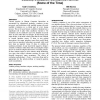Free Online Productivity Tools
i2Speak
i2Symbol
i2OCR
iTex2Img
iWeb2Print
iWeb2Shot
i2Type
iPdf2Split
iPdf2Merge
i2Bopomofo
i2Arabic
i2Style
i2Image
i2PDF
iLatex2Rtf
Sci2ools
128
Voted
CHI
2008
ACM
2008
ACM
Usability evaluation considered harmful (some of the time)
Current practice in Human Computer Interaction as encouraged by educational institutes, academic review processes, and institutions with usability groups advocate usability evaluation as a critical part of every design process. This is for good reason: usability evaluation has a significant role to play when conditions warrant it. Yet evaluation can be ineffective and even harmful if naively done `by rule' rather than `by thought'. If done during early stage design, it can mute creative ideas that do not conform to current interface norms. If done to test radical innovations, the many interface issues that would likely arise from an immature technology can quash what could have been an inspired vision. If done to validate an academic prototype, it may incorrectly suggest a design's scientific worthiness rather than offer a meaningful critique of how it would be adopted and used in everyday practice. If done without regard to how cultures adopt technology over time, then...
CHI 2008 | Groups Advocate Usability | Human Computer Interaction | Keywords Usability Testing | Usability Evaluation |
Related Content
| Added | 30 Nov 2009 |
| Updated | 30 Nov 2009 |
| Type | Conference |
| Year | 2008 |
| Where | CHI |
| Authors | Saul Greenberg, William Buxton |
Comments (0)

